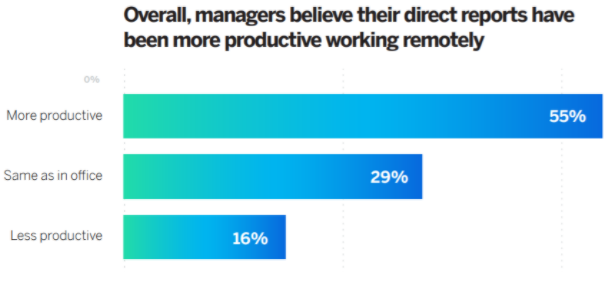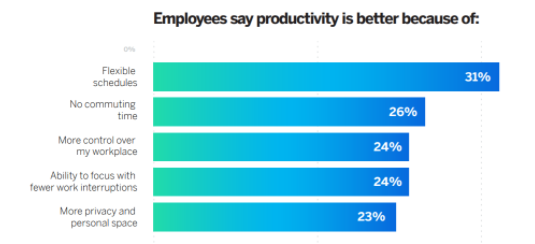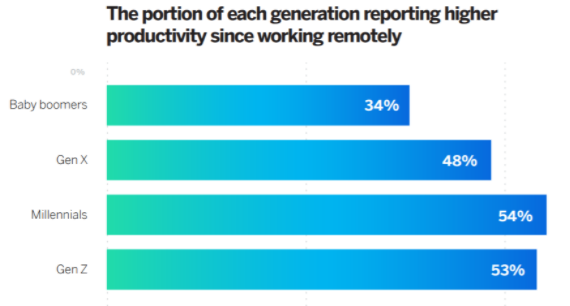Highlights from Qualtrics 'The Future of Work in 2021' report

Employee experience and the world of work has changed immensely in the last year and, according to a new report from Qualtrics, many workers globally feel they are more productive, more connected to their colleagues and more committed to operating with flexibility than even before the crisis.
For the report, entitled ‘The Future of Work in 2021,’ Qualtrics surveyed 4000 workers around the world about how the pandemic had affected their attitudes to working in terms of productivity, well-being and what they’re looking for as they reimagine the future agenda of work.
“As we cautiously navigate returning to work, we must recognize that customer and employee needs and priorities have shifted. We have a unique opportunity to listen directly to them and build on what we’ve learned during the pandemic,” said Julia Anas, Chief People Officer of Qualtrics.

Connection is complicated
A loss of connectedness to colleagues has been a persistent concern in the last year of global remote work. Looking at the results from Qualtrics, however, 35% of respondents actually felt more connected to their co-workers and community during this time, while 39% felt the same level of connection as before. Looking at the numbers closer, these figures are somewhat more complicated and split across different demographics. For example, men are 44% more likely than women to feel more connected since the pandemic began. In a year when record numbers of women have left the workforce, this disparity in a sense of connectedness could be linked to the global ‘she-cession’ phenomenon.
In terms of different races, 43% of Black workers felt more connected to their co-workers and community since the pandemic began, compared to 27% among white workers. This could speak to a more optimistic trend emerging from this year, in which it has emerged that inclusive, meaningful DE&I efforts might actually be better enabled by remote work. A recent report from HireVue, for example, revealed that remote working has enabled organisations to access a broader and more diverse candidate pool than before.

Productivity has risen
The results show direct reports and their managers are united in their belief that productivity has improved under remote work: the majority (55%) of managers said their direct reports have been more productive working remotely and 51% of employees said the same of themselves. At the start of the pandemic, in April 2020, employees also reported being more productive working remotely. However, they are 240% more likely to say this is the case now compared to just 39% who were more likely to feel productive back then, indicating just how transformative the last year has been in terms of how employees perceive their own abilities to work remotely and get things done to the same - if not better - levels.

Reasons for this uptick in productivity under remote work include flexible schedules (31%) and no commuting time (26%).
There is also something of a generational split in terms of how productive employees feel when working from home, with the majority of Gen-Z and Millennials feeling more productive, compared to just over a third of Baby boomers:

Wishes for Wellbeing
Wellbeing has been another key question managers have grappled with in the last year - how best to support their teams in their physical, mental, emotional, social and even financial wellness?
For leaders, the Qualtrics findings point to one critical area to boost wellbeing: transparency. The results show that employees at companies that have been proactive about announcing post-pandemic plans are 88% more likely (62% vs 33%) to say their overall wellbeing has improved than employees at companies who have not been as open about these post-pandemic plans. In a time of heightened uncertainty, employees are depending on leadership for open communication in order to feel a greater sense of security and wellness overall.
For those respondents whose well-being has declined, however, Qualtrics researchers uncovered 5 ways employees say employers can give them meaningful help:
- Conversations with my peers about the difficulties I’m facing
- Conversations with my manager about the difficulties I’m facing
- Access to the resources I need to do my job effectively (e.g. materials, equipment, technology, support services)
- Communication from my company leadership
- My manager demonstrating an interest in my personal well-being.
Hybrid or remote work is a dealbreaker
Another major finding is that remote and hybrid work is immensely popular. While this may not come as a huge surprise given how in-demand remote or flexible work arrangements were even before the pandemic, it’s notable how these attitudes have shifted just in the space of a year. For example, in July 2020, respondents were twice as likely to prefer working from home as in the office. However, in early 2021 respondents far preferred a hybrid model, indicating how the question of remote work isn’t as straightforward as just offering unlimited or permanent work-from-home options.
With that said, however, over half of respondents (53%) said an organisation’s long term remote work policy would make them consider staying at their company longer and 10% even suggested they would “probably” quit their job if a full-time return to the office was mandatory. Furthermore, the vast majority (80%) of respondents said it was important their employment afforded them the opportunity to live anywhere.
“Right now, every company is undergoing an experience transformation. There is no one-size fits all approach. From hybrid work environments, to online delivery and curbside pickups, employees and customers have more options than ever,” Anas added. “As companies work to rewrite their playbooks, those who take the time to understand and act on how people think and feel will be empowered to make the right decisions, at the right time, in the right way, and as a result will deliver differentiated experiences.”














